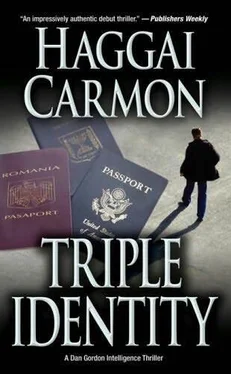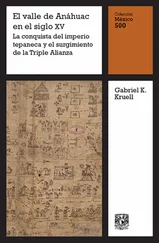Haggai Carmon - Triple Identity
Здесь есть возможность читать онлайн «Haggai Carmon - Triple Identity» весь текст электронной книги совершенно бесплатно (целиком полную версию без сокращений). В некоторых случаях можно слушать аудио, скачать через торрент в формате fb2 и присутствует краткое содержание. Жанр: Триллер, на английском языке. Описание произведения, (предисловие) а так же отзывы посетителей доступны на портале библиотеки ЛибКат.
- Название:Triple Identity
- Автор:
- Жанр:
- Год:неизвестен
- ISBN:нет данных
- Рейтинг книги:4 / 5. Голосов: 1
-
Избранное:Добавить в избранное
- Отзывы:
-
Ваша оценка:
- 80
- 1
- 2
- 3
- 4
- 5
Triple Identity: краткое содержание, описание и аннотация
Предлагаем к чтению аннотацию, описание, краткое содержание или предисловие (зависит от того, что написал сам автор книги «Triple Identity»). Если вы не нашли необходимую информацию о книге — напишите в комментариях, мы постараемся отыскать её.
Triple Identity — читать онлайн бесплатно полную книгу (весь текст) целиком
Ниже представлен текст книги, разбитый по страницам. Система сохранения места последней прочитанной страницы, позволяет с удобством читать онлайн бесплатно книгу «Triple Identity», без необходимости каждый раз заново искать на чём Вы остановились. Поставьте закладку, и сможете в любой момент перейти на страницу, на которой закончили чтение.
Интервал:
Закладка:
The office secretary, Lan, knocked on my door, walked in unceremoniously, and handed me a file folder.
“This just came in,” she said. “It looked like something you'd want to see right away.” I reached across my desk, took the folder, and began to read a cover memo.
OFFICE of INTERNATIONAL ASSET RECOVERY AND MONEY LAUNDERING
Memorandum To: Dan Gordon, Investigative Attorney From: David Stone, Director Date: September 15,1990 Re: U.S. v. Raymond DeLouise I'm assigning you this matter.
The subject Raymond DeLouise, born in Bucharest, Romania.
DOB: July 15,1927.
Whereabouts: Last known address: 44-21 Glendale Boulevard, Los
Angeles, CA 90021. Current address: unknown. The subject absconded from the United States soon after federal regulators discovered a $90 million shortfall at First Federal Bank of Westwood, California, where he was chairman and chief executive officer as well as principal shareholder. The FDIC took over after the bank's collapse and paid back the depositors as required, up to $100,000 per account. The FDIC has referred the matter to this office to attempt retrieval of the missing funds. They found sufficient evidence showing that the shortfall was not an accounting error or an accrued loss but was rather a result of possible defalcation, probably by Raymond DeLouise. Remarkably, there are no suspicious international wire transfers in large amounts or other evidence of the whereabouts of the missing funds. The criminal aspects of this matter were referred to the U.S. Attorney's Office for the Central District of California, which instructed the FBI to investigate. A grand jury is considering indicting him on multiple charges, including bank fraud and money laundering. Since the FBI believes that DeLouise has left the country, INTERPOL will be put on notice if he is indicted. My office has been asked to locate DeLouise and recover the lost money that we suspect was laundered through foreign entities. Neither the FDIC nor the Department of Justice has a clue where Raymond DeLouise might be. I enclose the FDIC report together with its attachments. Please report your findings to this office. David
I went through the twenty-page FDIC report and a brief FBI report. They looked very thorough but lacked a bottom line: If DeLouise or his money were outside the United States, they expected me to find both – and fast.
The government's working assumption was that he'd left the country – they all do. But where did he go? Was he sunbathing in the Bahamas? gambling in Monte Carlo? skiing in St. Moritz? Certainly with ninety million dollars in his pockets he didn't escape to a one-star hotel where, for an additional buck, they give you a mousetrap for your room. This guy probably wanted to keep his money in the dark and himself in the sun. The problem was that there were dozens of these sorts of places around the world. The FBI report indicated that his wife and adult son, who still lived in California, didn't know his whereabouts – or at least they claimed not to know.
I prepared a note to Lan. I'm attaching David Stone's memo with the new file. Please call your contact at the INS and ask for Raymond DeLouise's file. His social security number is in the new file. The subject was born in Romania and lived in the United States; therefore he must have an INS file. Ask your friend if it would be possible to get the file before the end of the millennium. Dan
The last time I'd asked the INS for assistance in retrieving an immigration file, it had taken six months. “It's a black hole out there,” a Justice Department veteran had once told me. “Unless you know someone in the particular office you need, you're nonexistent. They're so overworked and underbudgeted that they look through you as if you were air. Their telephone extension numbers are kept secret even from other government agencies. If you call for telephone directory assistance, you get an 800 number with nothing but long recorded messages. You can punch all the selections, but you'll never talk to a live body.”
Lan walked into my office. “I gave the INS the social security number you gave me for DeLouise, but they say another name came up.”
“Ask them to send a copy of that file anyway, we'll figure it out.”
The guy Lan knew at the INS must have owed her big-time, because I had the file on my desk within two days. I opened an old manila folder and read through it.
Bruno Popescu was born in Bucharest, Romania, on July 15, 1927. He first entered the United States on a tourist visa in 1957. He then sought political asylum and permanent residence, alleging that his life would be in peril if he ever returned to Romania. According to some documents in the file, Popescu claimed that he was suspected by the Romanian secret police as being “a provocateur in service of the decadent West.” There was no indication in his asylum application, or in any of the other documents, that he in fact was politically active in Romania. The file contained no evidence corroborating his claim of fear of persecution. Asylum was granted.
Was Popescu DeLouise? I read the INS file again and compared it with the documents Stone had given me. There were several similarities: same date and place of birth, identical social security number and entry date to the United States. It was possible therefore that Popescu had changed his name to DeLouise after he had been naturalized. I made a note to revisit that issue.
The whole thing was unusual, though; DeLouise or not, how had Popescu obtained a tourist visa to enter the United States before he filed for asylum? The year 1957 was a time of great tension between the West and the Soviet-dominated Eastern Bloc countries. The Cold War was at its peak. In tandem with France and the United Kingdom, Israel had just invaded Soviet-sponsored Egypt's Sinai Peninsula and faced down Soviet and U.S. threats demanding its withdrawal. Polish students and workers were up in arms. Hungary had simmered politically until the rebellion finally erupted – the Soviets had sent in tanks in 1956 to quell it.
As a consequence the United States was substantially limiting entry of visitors from the Eastern Bloc countries, fearing that spies and saboteurs would arrive disguised as tourists. In that political climate, then, there must have been a good reason for an American Consulate to grant Popescu a U.S. tourist visa. But his asylum application wasn't convincing or supported by any evidence. So how had Popescu managed it?
I turned the yellowed pages and found a summary document, handwritten by the INS examiner of Popescu's asylum application. Among the routine bio data, I almost missed some information at the bottom of a folded page: Passport: Romanian, issued in Bucharest, Romania, on February 21, 1947, valid for five years. U.S. visitor's visa issued by the American Consulate in Tel Aviv on November 23, 1957. Date of arrival to Idlewild Airport, New York, December 14, 1957.
“I'll be damned,” I whistled in surprise. If this was the DeLouise file, what did he have to do with Israel? Nothing in the other documents showed any reference to his ethnic origin or how he might have ended up in Israel. This was really strange, I thought. If this person's Romanian passport had been issued for five years in 1947, it had expired in 1952. There was no indication that the passport had been renewed. Why did the American consul in Tel Aviv stamp a visa in 1957 when the passport had expired in 1952? That couldn't have occurred. Something else must have happened, something that was not reflected in this slender file. The passport could not just have been renewed. A whole slew of other possibilities quickly passed through my mind. Photocopy machines were rare in 1957, however, and there was no copy of the passport in the file. My seeds of suspicions would have to wait for further information in order to germinate and bear fruits of success. The INS file showed that DeLouise was issued asylee status pending the review of his political asylum application. The asylum application was approved on March 8,1958, and subsequently a green card was issued, giving him permanent-resident status. Five years later, on July 4, 1963, Popescu was naturalized and became a U.S. citizen. There were no further records in the file.
Читать дальшеИнтервал:
Закладка:
Похожие книги на «Triple Identity»
Представляем Вашему вниманию похожие книги на «Triple Identity» списком для выбора. Мы отобрали схожую по названию и смыслу литературу в надежде предоставить читателям больше вариантов отыскать новые, интересные, ещё непрочитанные произведения.
Обсуждение, отзывы о книге «Triple Identity» и просто собственные мнения читателей. Оставьте ваши комментарии, напишите, что Вы думаете о произведении, его смысле или главных героях. Укажите что конкретно понравилось, а что нет, и почему Вы так считаете.











